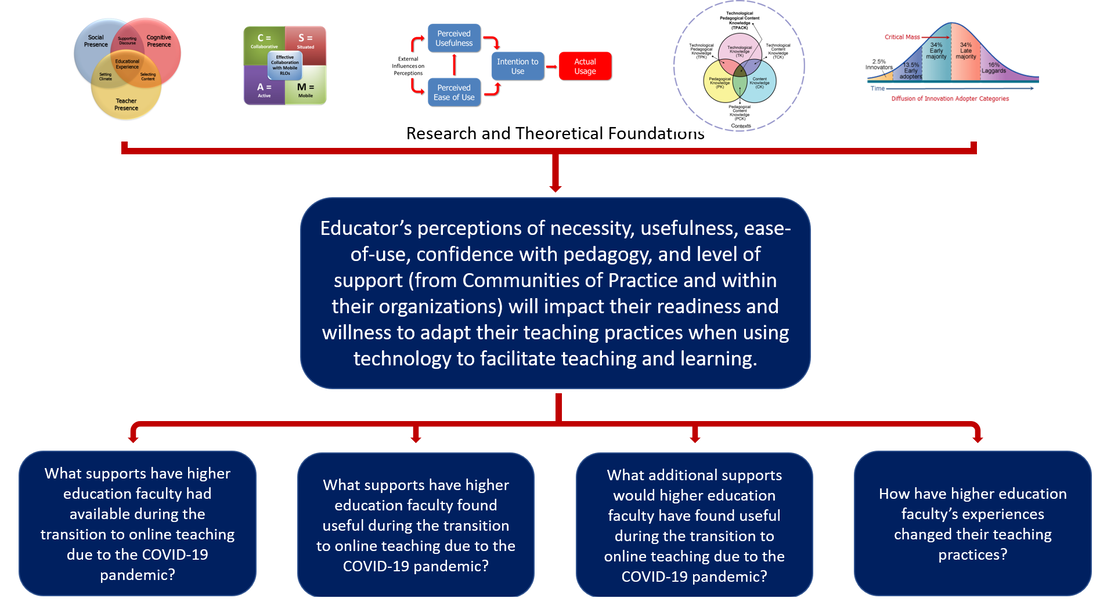Research Problem
Beginning in early 2020, the COVID-19 pandemic forced Canadian higher education faculty and their institutions to shift to online course delivery and interactions with colleagues and students (Masri & Sabzalieva, 2020; Rapanta, et al., 2020). This represented a perception of need for innovation in the form of adopting new technologies and pedagogical practices. As illustrated by the conceptual framework presented in Figure 1, this research investigated the levels of support for this transition perceived amongst faculty members at Canadian higher education institutions. The research also investigated the impacts that perceived supports had on their adoption of new technologies and new teaching and learning approaches. It also explored how faculty perceive the transition to online course delivery impacted their teaching practices both while teaching online, and after they returned to campus.
Conceptual Framework
Research Questions
1. What supports did higher education faculty had available to them during the transition to online teaching as a result of the COVID-19 pandemic?
- What supports did higher education faculty avail of?
- Which supports did higher education faculty find valuable? Why?
- Which supports did higher education faculty find less valuable? Why?
- What types of additional supports do higher education faculty feel would have been valuable to them during the transition to online teaching as a result of the COVID-19 pandemic?
- How do higher education faculty think their experiences during the transition to online teaching during the COVID-19 pandemic will impact their teaching practices in the classroom?
Significance of the Research
This research investigated the impacts that perceived supports had on the adoption of new technologies and new teaching and learning approaches among teaching faculty at Canadian higher education institutions. This research also investigated how faculty perceived the transition to online course delivery impacted their teaching practices after they returned to campus. The results of this research have provided information that will be useful to administrators, policy-makers, and others involved with planning for and supporting online teaching and learning programs, and supporting faculty who teach online, both during crisis situations such as the COVID-19 pandemic, and during periods of normal institutional operations.
Results and Publications
Our findings on the supports leveraged by faculty at two Canadian universities, Cape Breton University and Ontario Tech University, and the impacts of their online experiences on their teaching practices, were presented at the Canadian Network for Innovation in Education's (CNIE|RCIE) 2023 Annual Conference in May 2023. Findings related to faculty supports for the transition to online teaching were published in 2023 in the Journal of Education Informatics. A second paper focusing on the impacts of the transtion to online teaching on faculty's teaching practices are forthcoming in the International Journal of E-Learning and Distance Education.
|
Conference presentation at the CNIE|RCIE 2023 Annual Conference (virtual), May 2023
|
Research Papers
|
Conclusions and Recommendations
Conclusions and Recommendations: Faculty Supports |
Conclusions and Recommendations: Faculty Practices |
Research Team
|
Dr. Rob Power
Assistant Professor, Education, Cape Breton University, Canada Dr. Rob Power is currently an Assistant Professor of Education at Cape Breton University. He has an extensive background in educational technology integration and instructional design for online and blended learning in K12, post-secondary, and workplace training contexts. Dr. Power has worked as an instructional design consultant and as the Leader of the Online Learning team with the Fraser Health Authority in British Columbia, Canada. He has also served in leadership roles with the International Association for Mobile Learning (IAmLearn) and the Canadian Network for Innovation in Education (CNIE). Dr. Power is also a founding member of the Pedagogy, Education and Technology Lab (PETL) and the International Research Network for Innovative Sustainable and Seamless Learning (IRN-ISSE), and president of Power Learning Solutions. |
|
Dr. Robin Kay
Dean, Faculty of Education, Ontario Tech University Dr. Robin Kay is currently the Dean and a Full Professor in the Faculty of Education at Ontario Tech University in Oshawa, Canada. He has published over 200 articles, chapters, and conference papers in the area of pedagogy, education, and technology and has taught in the fields of computer science, mathematics, and educational technology for over 30 years at the high school, college, undergraduate, and graduate level. Current projects include research on AI in education, e-learning tools, online and blended learning in secondary and higher education, video podcasts, scale development, emotions and the use of computers, and factors that influence how students learn with technology. Dr. Kay received his MA in Computer Applications in Education at the University of Toronto and his PhD in Cognitive Science (Educational Psychology) at the University of Toronto. |
|
Chris Craig
Continuous Learning, Ontario Tech University Chris Craig is passionate about education and has diverse life experiences outside of academia, which include the arts, business, construction, entertainment, and health. Focusing on adult education, Chris aims to establish and promote actionable insight for educators and students alike with the vision of supporting learner self-concept: Who they are in the context of the environment. Chris is currently engaged in the Doctor of Education program at Ontario Tech University and has also earned a MEd, BA, AS-PE, and certificates in project management, art, and entrepreneurship. |
References
Masri, A., & Sabzalieva, E. (2020). Dealing with disruption, rethinking recovery: Policy responses to the COVID-19 pandemic in higher education. Policy Design and Practice, 3(3), 312–333, https://doi.org/10.1080/25741292.2020.1813359
Power, R. & Kay, R. (2023). Higher education faculty supports for the transition to online teaching during the COVID-19 pandemic. Journal of Educational Informatics, 4(1), 49–72. https://doi.org/10.51357/jei.v4i1.191
Power, R., Kay, R., & Craig, C. (2023). The Effects of COVID-19 on Higher-Education Teaching Practices. International Journal of E-Learning & Distance Education, 38(2). https://www.ijede.ca/index.php/jde/article/view/1255/1899
Rapanta, C., Botturi, L, Goodyear, P., Guàrdia, L., & Koole, M. (2020). Online university teaching during and after the Covid-19 crisis: Refocusing teacher presence and learning activity. Postdigital Science and Education, 2, 923–945. https://doi.org/10.1007/s42438-020-00155-y
Power, R. & Kay, R. (2023). Higher education faculty supports for the transition to online teaching during the COVID-19 pandemic. Journal of Educational Informatics, 4(1), 49–72. https://doi.org/10.51357/jei.v4i1.191
Power, R., Kay, R., & Craig, C. (2023). The Effects of COVID-19 on Higher-Education Teaching Practices. International Journal of E-Learning & Distance Education, 38(2). https://www.ijede.ca/index.php/jde/article/view/1255/1899
Rapanta, C., Botturi, L, Goodyear, P., Guàrdia, L., & Koole, M. (2020). Online university teaching during and after the Covid-19 crisis: Refocusing teacher presence and learning activity. Postdigital Science and Education, 2, 923–945. https://doi.org/10.1007/s42438-020-00155-y




